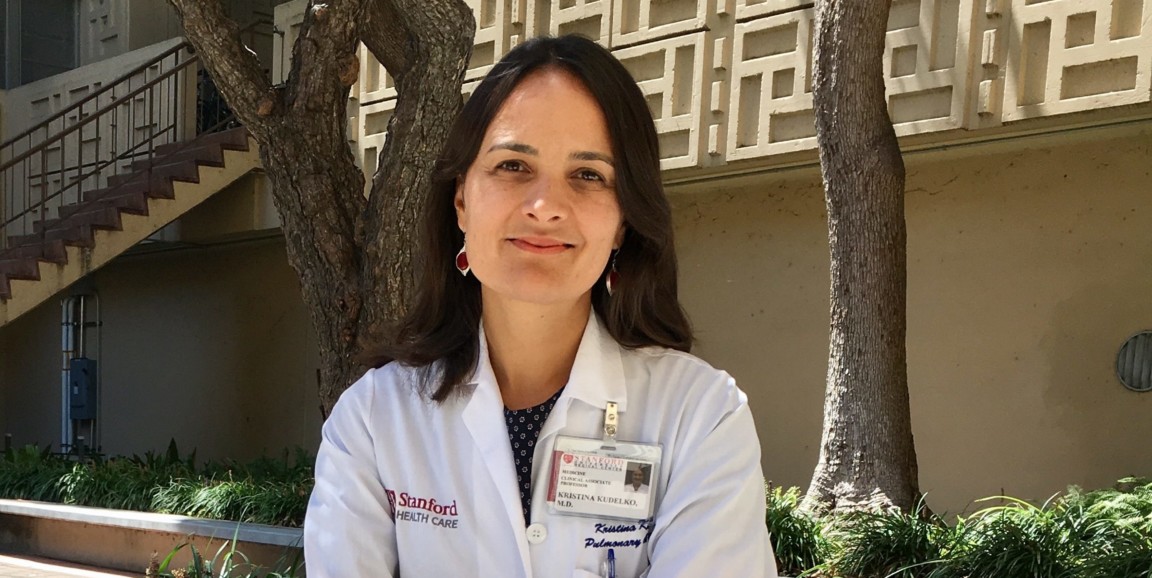Kristina Kudelko, MD, clinical associate professor of medicine, expected to return to New York after a fellowship in pulmonary hypertension, but she unexpectedly fell in love with Stanford and has called it home since 2008. I spoke with her to learn more.
Why did you go into medicine?
I thought that I was going to do something in the humanities. I liked music but I wasn't talented enough to have a career in it. I thought about journalism too. But I got swept up into intro to bio classes that I took just to fill requirements at Yale. I became really interested in biology, and thought maybe I would do marine biology.
In the end, a huge component was my brother. He's a role model for me and a neurologist. It seemed like a good fit. I did a year of research at the National Institutes of Health, but realized I really liked the clinical side.
Why pulmonary hypertension?
When you do pulmonary and critical care medicine, a lot of people go into it initially for the acute, critcally ill patients. That's what drew me in.
Pulmonary hypertension, or high blood pressure in the lungs, is a complex disease that fulfills the acuity criteria. It is also enmeshed in the field of heart failure. I've always not so secretly wanted to be a cardiologist.
What is the biggest challenge in your field right now?
Pulmonary hypertension still has a horrible prognosis. It's a progressive disease with no cure. We are much better at identifying and treating it these days, but with the best of therapies, there is at best a 70 percent survival rate at five years. That's hard. And it affects a lot of young women.
What is most fulfilling about your field?
I like the challenge of working with a rare and complicated disease. But the most fulfilling part of what I do is shedding light on the disease for my patients -- letting them know exactly what's going on and providing hope that they are at a center that is aggressive in treating it and in giving them their quality of life back.
What is your ultimate career goal?
I feel very lucky because it is what I'm doing now. I have a really great balance between seeing patients and being part of an educational initiative focused on educating all tiers of people involved with the disease. I'm involved heavily in the training program for future PH specialists. I'm involved in educating the community and my patients. This educational initiative is something I take a lot of pride in.
How do you unwind?
I like to go running around campus, where it's nice and flat. When I'm feeling more ambitious, I try to run the Dish. I love playing tennis with my husband and watching Michigan football. I bing watch some TV episodes late night on Amazon, like "The Office."
Also, I love playing with my kids (ages 2 and 5) and listening to music. I used to play the piano and the viola and we actually just acquired a piano -- I'm so excited to play again.
What do you listen to?
I appreciate all kinds of music -- anything from Beethoven to Jay Z to Justin Bieber. I wouldn't be truthful if I didn't mention Baa Baa Black Sheep.
Do you have a role model?
It may sound cliché, but my parents. My dad was a mechanical engineer who has a huge interest in the humanities. I always felt connected to him in that way. He introduced me to classical music and would take me concerts and museums.
My mom emigrated from Poland at 16. She is a brilliant, humble woman. She was interested in computers and science, but sacrificed her career to raise the three of us. My brother is a neurologist and my sister graduated from Yale law school. We credit our parents every day for their influence and how they stressed education. They see education as a gift and we respect it so much. I feel so grateful for those values.
Stars of Stanford Medicine introduces readers to standout scholars in the School of Medicine.
Photo by Alyssa Tamboura




